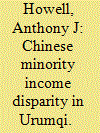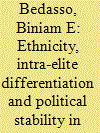|
|
|
Sort Order |
|
|
|
Items / Page
|
|
|
|
|
|
|
| Srl | Item |
| 1 |
ID:
126780


|
|
|
|
|
| Publication |
2013.
|
| Summary/Abstract |
Ethnic tensions between Uyghur and Han Chinese culminated in 2009 with the Urumqi riots, one of the bloodiest conflicts in Xinjiang's modern history, which left more than 200 people dead and another 1,700 injured. Following the 2009 Urumqi Riots, Chinese policy towards Xinjiang underwent a major shift, breaking away from its previous "gradualist" approach to one of economic development. In its place, China implemented policies meant to spur "leapfrog development" in Xinjiang. These new economic policies are likely to bring about rapid growth to the region; however, the question remains whether this growth will be equitably transferred amongst all ethnic groups and regions within Xinjiang.
|
|
|
|
|
|
|
|
|
|
|
|
|
|
|
|
| 2 |
ID:
139633


|
|
|
|
|
| Summary/Abstract |
Politics in Kenya remains vulnerable to ethnic tensions despite its openness and vibrancy, but it can also be argued that Kenyan politics is becoming increasingly mature. This article explains the political economy dynamics behind the first two orderly presidential successions in post-colonial Kenya. It proposes a conceptual framework that shows how instrumental ethnicity plays out in a quasi-differentiated society in which ethnic organizations are the key conduits for the flow of rents between political and economic elites. More specifically, it shows how the internal fragmentation of ethnic groups intensifies the structural uncertainties that are commonly associated with intra-elite pacts in weakly institutionalized polities. It is argued that the 1978 and 2002 presidential successions in Kenya were orderly, paradoxically, because some of the crucial political and ethnic organizations were fragmented to the extent that they created conditions of great uncertainty for the elite. In this context, the rule of law was upheld as a last-ditch strategy to mitigate uncertainties in the face of rampant fragmentation. This shows that ultimately elite fragmentation can generate political stability provided that there is enough at stake for the elites.
|
|
|
|
|
|
|
|
|
|
|
|
|
|
|
|
| 3 |
ID:
118420


|
|
|
|
|
| Publication |
2012.
|
| Summary/Abstract |
For six decades, China's central authorities have promoted development in ethnic regions through special fiscal allocations with the idea that economic development is the key to national integration and inter-ethnic harmony. Yet, inter-ethnic tensions and violence persist in China. Focusing on historical changes to fiscal allocations as the principal policy instrument used by Beijing to promote development in ethnic areas, this analysis finds these changes mirror broad shifts in the country's national development strategy. As the study argues, this pattern reflects an approach to development policy in ethnic regions whereby policies serve central objectives consistent with a policy process for determining the fiscal allocations to ethnic regions that has been both centrally concentrated and non-participatory. With evidence that this "non-engaging" approach may be exacerbating ethnic tensions, Beijing has made efforts to introduce more "inclusive" approaches to determining policies for ethnic regions; however, whether these approaches will be institutionalized remains unclear.
|
|
|
|
|
|
|
|
|
|
|
|
|
|
|
|
| 4 |
ID:
095040


|
|
|
|
|
| Publication |
2010.
|
| Summary/Abstract |
Using the ITERATE dataset, we explore the origins of transnational terrorist activity, from 1982 through 1997, in 118 countries. We model terrorism, not as a function of a nation's ethnic, religious or linguistic fractionalization, but as an independent measure of perceived ethnic tensions. When we control for institutional quality, evidence that political rights and civil liberties mitigate the terrorism-producing effects of ethnic tensions exists only since 1990. Economic freedoms, on the other hand, robustly reduce the number of terrorist attacks originating in ethnically tense societies.
|
|
|
|
|
|
|
|
|
|
|
|
|
|
|
|
| 5 |
ID:
116306


|
|
|
|
|
| Publication |
2012.
|
| Summary/Abstract |
Fiji's post-colonial journey has been fraught, a promising beginning hobbled by political instability, periodic military coups and stagnant economic growth. Political disagreements over the best form of political representation have featured prominently in Fiji's political discourse, with no enduring resolution in sight.
|
|
|
|
|
|
|
|
|
|
|
|
|
|
|
|
|
|
|
|
|